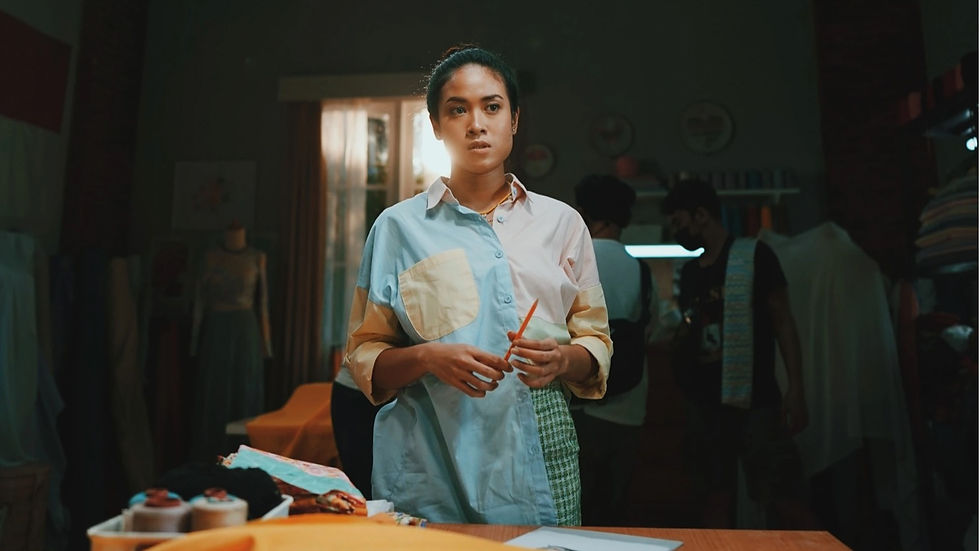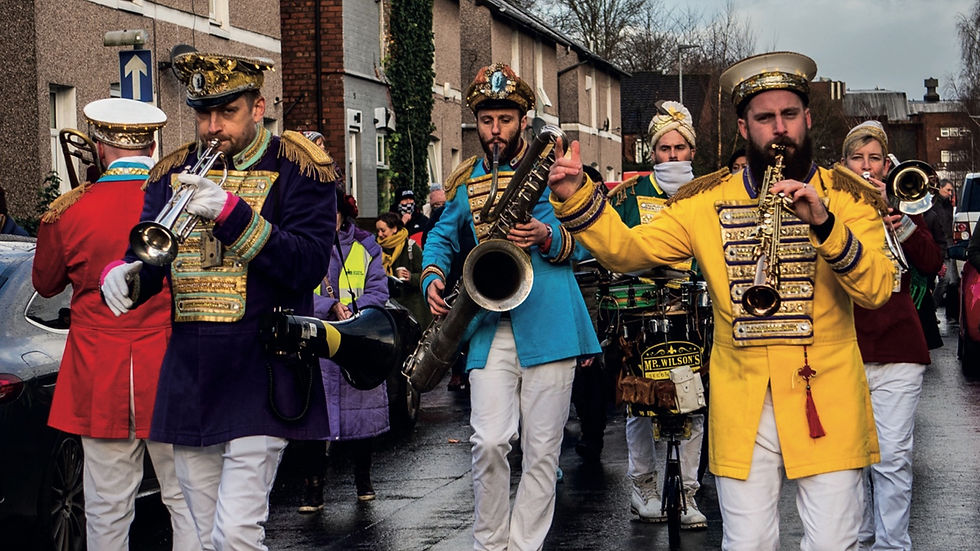2022 roundup
- culturecommons
- Dec 23, 2022
- 6 min read
Updated: Jun 15, 2023
As we wind down for festive season, we're reflecting on just a few of the projects Culture Commons has been involved throughout 2022...

The Covid-19 pandemic might feel like it’s in the rear-view mirror for many, but its impact is still very much being felt across the UK's creative and cultural sectors. Throughout 2022, we continued our work with brilliant research partners at the Centre for Cultural Value, building on the work we did together on the largest study into the impacts of Covid-19 on the UK's cultural sector anywhere in the world, 'Culture in Crisis'.
In May 2022, Culture Commons worked up a series of 12 policy recommendations directed towards the UK Government on workforce, business models, place and funding, which we launched at an event in the UK Parliament with the support of the Minister for the Arts and Shadow Minister for Science, Technology and Research. We will continue to engage with Ministers and officials across Government departments on those 12 recommendations in 2023.

Back in February, we established a new relationship with researchers at the University of Bristol working on the ‘Connecting through culture as we age’ programme – part of the UKRI’s ‘Healthy Ageing Challenge’. The team are exploring how and why people take part in arts and culture as they get older and working with technologists and older people to co-design products that can really support them to stay connected in ways that are meaningful to them. Culture Commons are making sure that the emerging findings are getting through to policy makers in the Department for Health and Social Care and decision makers across the UK. We’re pleased to be ramping up our activities with University of Bristol and the core research team into 2023.

In 2020, Culture Commons brought several national partners together, including Excluded UK and trade unions, to lead the 'Creative Workforce Pledge' campaign - a 10-point plan we designed to aide Metro Mayors leading combined authorities across England to support the creative and cultural sector workforce in their areas. This work was in direct response to the difficulties workers in these sectors experienced – particularly those who are freelance, self-employed, and atypical and from already underrepresented demographic groups. With the support of over 14,000 campaigners, we got six elected Metro Mayors signed up, and we're now collaborating with them and their teams to bring the spirit of those policies to life for millions of people they serve. The campaigns impact is being felt far and wide: for example, we're delighted that Creative UK have picked up and run with Culture Commons’ call for a ‘Freelance Charter’ through their ‘Reimagining Freelancing’ programme and we’ll be feeding in our findings and recommendations from our ‘Workforce’ work-stream as we go through 2023…

Speaking of our ‘Workforce’ workstream, earlier this year we teamed up with Art Ultra to commission three artists to create unique works to complement our ‘Creative Workforce Workshops’ series. Over the course of 2022, the Culture Commons team visited Turo, Rotherham and Croydon to facilitate paid workshops for freelance, self-employed, and atypical workers about how where they are based affects their careers. The report will be published on our website in Q1 2023 (we’re going to try and do something a bit funkier with this so do come back check it out!), and we’ll also be sharing a report with the Secretary of State for Digital, Culture, Media and Sport (and her Shadow) and local leaders in each of the three locations to help keep issues around the workforce up the policy agenda. Thanks to Arts Council England for the grant that made this work possible.

In Q3, we were commissioned by the University of Manchester to produce a paper on 'Creative Improvement Districts' – a potentially transformative new model of culture-led regeneration that was first conceived by the Greater Manchester Combined Authority. Now Stockport and Rochdale are now rolling the model out following substantial investments from Levelling Up funds, with other areas in Greater Manchester and further afield exploring the concept too. In November this year, the Local Government Association featured Culture Commons’ thinking in their own landmark report into the role of culture and local government – a significant endorsement to end the year on! We’ll be ramping up our work on ‘Place’ from Q1 2023, so we encourage anyone reading this with a relationship to a local authority to share our paper with your relevant portfolio holders to help us get the word out there.

Towards the end of the year, we were approached by the Greater Manchester Integrated Care System team to support them on the ‘Greater Manchester Creative Health Strategy’. Backed by the GM Combined Authority, the new Strategy aims to position culture and creativity at the very heart of a region-wide approach to supporting health and wellbeing, creating the world’s first ‘Marmot’ city region. Culture Commons will be working with the team to raise awareness of this ground-breaking work amongst decision makers nationally and internationally, and designing a policy development plan which will run alongside an AHRC funded research programme in 2023.

Last year, we worked on a major AHRC funded umbrella project, 'Pandemic and Beyond' bringing 77 studies from across the UK together to understand the impacts of the arts, humanities and social sciences research on our understanding of the Covid-19 pandemic. In November 2022, the core team published the final project report, specifically highlighting the important role that Culture Commons played in brokering relationships with key decision makers in UK Government departments. We were so chuffed with the findings, we published a news item on it!

Throughout the year, we submitted lots of evidence to official parliamentary enquiries led by Select Committees in the UK Parliament their equivalents in the devolved administrations, including this one on the role of culture in ‘Levelling Up’ which we put together for the Digital, Culture, Media and Sport Committee. We also featured in several reports by the UK Parliament, including this POST note (a briefing for MP's put together by internal staff) on 'The impact of digital technology on arts and culture in the UK'.

For those that don’t know, we do things differently here at Culture Commons. We operate a not-for-profit and cross-subsidy model, which enables us to support stakeholders in the creative and cultural sectors who might not otherwise take part in policy dialogues. This year, our work continued with Stand and Be Counted – the UK’s first Theatre Company of Sanctuary – supporting migrants, refugees and people seeking sanctuary here in the UK through creative activities. We’ve helped the core team to engage the Home Office in dialogue on behalf of their participants, as well as pen a series of open letters on specific areas of policy of interest to their teams. We have a number of other partner we work with discreetly, all made possible thanks to funding from the Paul Hamlyn Foundation.

As we look ahead to 2023, we have a number of projects lined up. But we won't take up any more of your 2022 on those here - we encourage you to sign up to our newsletter to stay up to date as things develop. Lastly, if you are policy-curious, have worked in the policy space and would like to talk to us about becoming involved in our work here at Culture Commons, or if you have a project that could lead to policy impact, do get in touch with us at contact@culturecommons.uk and a member of the team will be back in touch to set up an informal chat in the new year. For now, the team at Culture Commons wishes you and yours a very restful and happy festive season, and a happy new year. See you on the other side!
About Us We campaign, convene and research, working with our clients and partners to co-produce policy and recommendations that are accessible, impactful, and implementable. We work in strategic ways to seize the moment and drive the change our clients and partners want to see in the world. Our team is made up policy experts, creative and cultural sector leaders, former politicians, grassroots activists, and parliamentary advisers who all have track records of taking ideas from proposal into law. We blend our in-house experiences to build impactful advocacy programmes and campaigns to influence policy makers at the local, national and international levels. We also regularly work with universities, think tanks and independent research institutions. Based in London and Manchester, we operate a cross-subsidy and not-for-profit model that enables us to both work with leading creative businesses and research institutions, but also support smaller and grassroots creative and cultural organisations - ensuring that all voices are heard in policy making processes. We are kindly supported with project and core grant funding from the Paul Hamlyn Foundation, Arts Council England, Arts and Humanities Research Council, Federation of Entertainment Unions and Research England. If you would like to discuss how we might work with you or your organisation, get in touch contact@culturecommons.uk




Comments